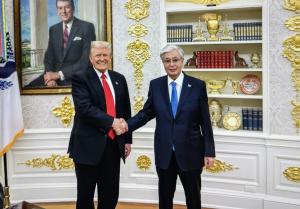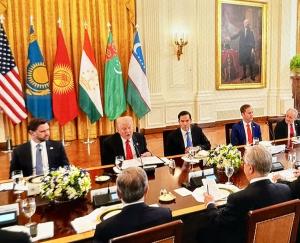U.S.–Kazakhstan Economic Partnership Surges to $117B Following $17B in New Agreements Signed in Washington
Following new accords, U.S.–Kazakhstan partnership aims for $130 Billion milestone—boosting jobs, innovation, and critical-minerals security.
WASHINGTON, DC, DC, UNITED STATES, November 10, 2025 /EINPresswire.com/ -- The United States and the Republic of Kazakhstan have announced $17 billion in new bilateral agreements following high-level meetings at the U.S. Department of State and The White House Thursday, bringing total 2025 deal commitments between the two countries to $117 billion.
The announcements coincide with the arrival of Kazakhstan’s reform-minded President Kassym-Jomart Tokayev in Washington for the C5+1 U.S.–Central Asia Summit at the White House—his first official U.S. visit since taking office. The summit marks a defining moment for U.S.–Kazakh relations as cumulative American investment in Kazakhstan surpasses $100 billion, with both sides setting a new target of $130 billion by year-end 2025.
The new accords announced in Washington build on a wave of earlier 2025 deals positioning Kazakhstan as America’s most strategic partner in Central Asia—a region balancing relationships with both Russia and China while advancing an independent, pro-Western economic policy.
Key agreements include:
+ Chevron’s $47 billion Tengiz expansion – one of the largest single foreign investments globally, boosting output by 262,000 barrels per day and deepening U.S. leadership in global energy markets.
+ Boeing & Air Astana – a $7 billion procurement of 18 Boeing 787-9 Dreamliners to modernize the flag-carrier’s fleet, supporting domestic U.S. aerospace jobs.
+ Wabtec Locomotive Agreement – a $4.2 billion order for 300 locomotives (the largest rail-equipment transaction in U.S. history), creating 11,000 jobs in Pennsylvania and Texas while modernizing Kazakhstan’s freight network.
+ John Deere Agricultural Partnership – $3–5 billion in agricultural‐equipment sales and local manufacturing, expanding Kazakhstan’s food-security infrastructure and rural employment.
+ Cove Capital Tungsten Project – $1.1 billion investment to build a tungsten mining and processing complex, strengthening global critical-minerals supply-chains.
+ Leidos Air-Traffic Modernization – $200 million contract to overhaul Kazakhstan’s national air-traffic-management system with cutting-edge U.S. technology.
+ AI & Digital Development Cooperation – $3.7 billion in joint-ventures with NVIDIA, HP, Cisco, Oracle, Starlink, GDA and Joby Aero Inc., anchoring Kazakhstan’s “AI Alliance” with Silicon Valley and advancing digital-sovereignty alternatives to Chinese infrastructure models.
+ Cerberus Capital Management & National Bank of Kazakhstan – $250 million private-equity investment platform to support cross-border projects in manufacturing, energy and logistics.
“These agreements are a testament to the growing trust and mutual opportunity that define our partnership,” said President Tokayev after meetings at The White House. “Over the past three decades, the United States has invested more than $100 billion in Kazakhstan’s economy. Today’s new projects bring that total to $117 billion and mark a powerful expansion of our cooperation in technology, energy, and innovation.”
Both nations emphasized the importance of investing in the next generation of leaders and preserving cultural heritage. Kazakhstan announced a new contribution to the Kennedy Center for the Performing Arts, funding joint-arts programmes and exchange initiatives.
Additional partnerships with the Smithsonian Institution, the Union of Artisans of Kazakhstan, and the Kazakhstan Cultural Heritage Fund will support bilateral research and preservation efforts under the U.S. Ambassadors Fund for Cultural Preservation.
Strengthening Critical-Minerals Security
A new Memorandum of Understanding on Critical Minerals Cooperation, signed by U.S. Commerce Secretary Howard Lutnick and Kazakhstan’s Minister of Industry and Construction Yersayin Nagaspayev, establishes collaboration in exploration, processing, and supply‐chain transparency for minerals essential to clean-energy and advanced manufacturing.
Kazakhstan’s vast reserves of tungsten, uranium and rare-earth elements will anchor joint efforts to build resilient, non-Chinese supply-chains supporting the global energy transition.
A Model for Multipolar Diplomacy
Through its “multi-vector” foreign policy, Kazakhstan continues to maintain peaceful relations with Moscow and Beijing while aligning economically with Washington—a balancing act that analysts describe as a model of pragmatic diplomacy in a multipolar world.
President Tokayev has also advanced ambitious UN reform and climate-leadership goals, pledging to host a Central Asian Ecological Summit in Astana next spring.
With $117 billion in commitments already secured this year, Kazakhstan has become one of America’s most dynamic partners for energy, innovation. It is a powerful demonstration of how diplomacy and commerce can move in lockstep to advance shared prosperity.
John Arundel
Perdicus Global Communications
+1 703-963-4191
john@perdicuspr.com
Legal Disclaimer:
EIN Presswire provides this news content "as is" without warranty of any kind. We do not accept any responsibility or liability for the accuracy, content, images, videos, licenses, completeness, legality, or reliability of the information contained in this article. If you have any complaints or copyright issues related to this article, kindly contact the author above.


